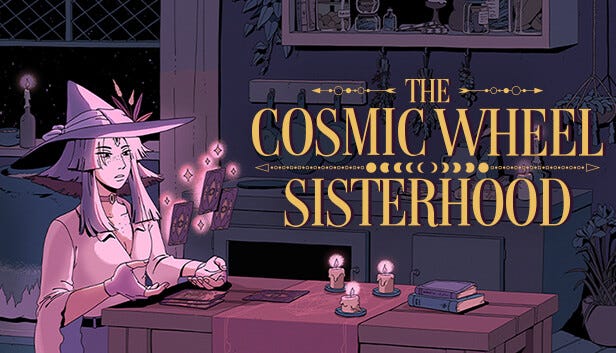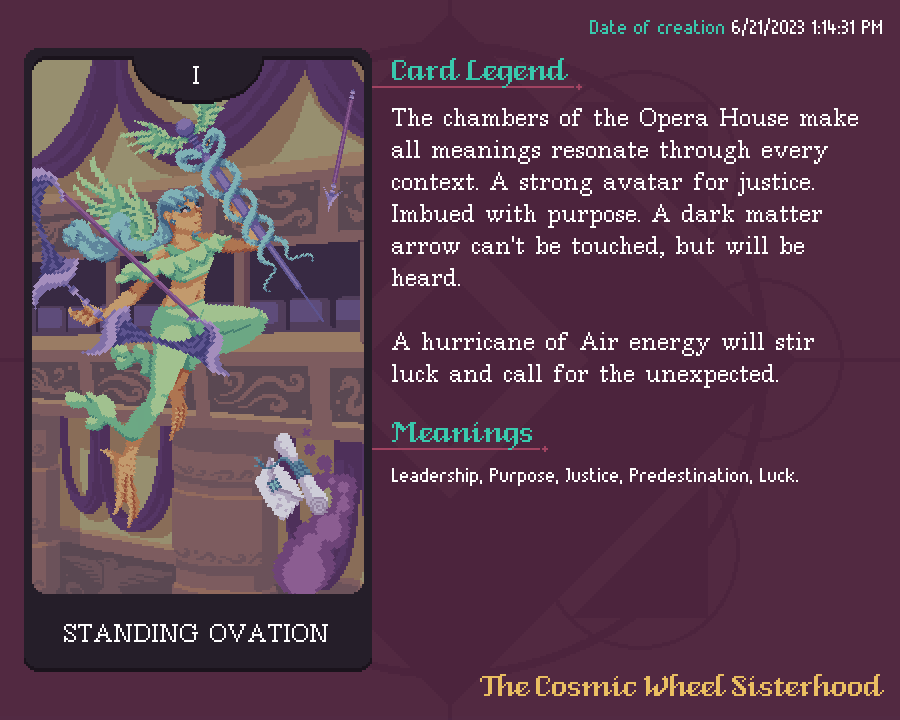The Cosmic Wheel Sisterhood is a minimalist visual novel. All the fat, cut out. It starts heavy, ends heavy. The writing orbits around stories, randomness, and miniature bites of creativity. The lore drips with occult mystery. The gravity of the player’s actions become weighty, weird, and beautiful. It feels completely random until little revelations piece together. A system designed for a mad witch who thinks in riddles.
The deck collage part of the game is its most unique feature. Creating the first card starts off ugly like a coloring book accompanied by bad crayons. Each of these elements contain vague keywords that twist into rationale. At first, the magic feels random, aimless. The game confines the player a few choices, repeats a couple times, and does not bother to explain itself. Scornful arrogance marks the design, but with callousness comes inspiration.
That’s what makes the mechanic tick. Creating a beautiful card offers no in game reward, but an out-of-game one. You made something, its meaning secret to you and you alone. The card, no matter how absurd, dictates an outcome from memory. Your choices predestined the card’s existence in your deck. Sometimes players forge cards to make something. Sometimes, players pool their magic to make a thematic card. The unintentional planning for an outcome that may never happen is the secret sauce of The Cosmic Wheel Sisterhood. Sometimes a player stops playing the game and just makes something, akin to Minecraft Creative mode.
The bed unlocks my favorite part of the game: interactive fiction. Stories that pull you in with the gravitas of a grand dungeon master. Pictures painted in the mind’s eye, its choices heaving with decision. It encapsulates drama and escape. At the end, a small reward of Magic. This reward contextualizes the theory behind the resource. The emotions tied to each element will sometimes suprise, sometimes affirm. I desperately yearn for other games to do this.
This sense of awe does not last forever. There comes a time where magic decouples from harsh decisions. The fabric of mystery unravels. The high stakes of the plot push it forward, but players will look back and wonder where the emotions went. It may be the reason why this game hasn’t won a Bestest Bests from Rock Paper Shotgun.
Still, for a game as small as this one, it is a feat. You may think yourself immune to its aesthetic. Players will find it easy to dismiss it as a dream of a twenty-something non-binary. For me, it demystified the allure of Tarot, an activity I’ve always looked upon as a strange substitute for church sundays. Cards are vehicles for stories, and stories can heal or hurt. The process renders itself invisible through captured attention. Getting to the storytelling part, that’s the power of cards with weird illustrations. There’s power in that. Not in the community of Tarot readers, but the individual moments of attention, given from one person to another.
I played this game entirely in bed on a Steamdeck. I escaped into the tiny screen and forgot that my hands were both hot and cold. Cards formed memories, both in their creation and drawing. Sleep took me during Asteroid by Fingerspit. It is an oddly perfect game that requires no further expansion. Too large, the game would drag on and any smaller, the game would not carry substance. I will visit it from time to time and see how the deck treats me.




